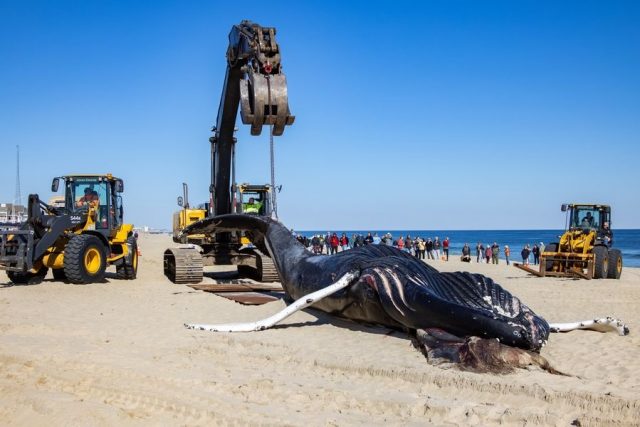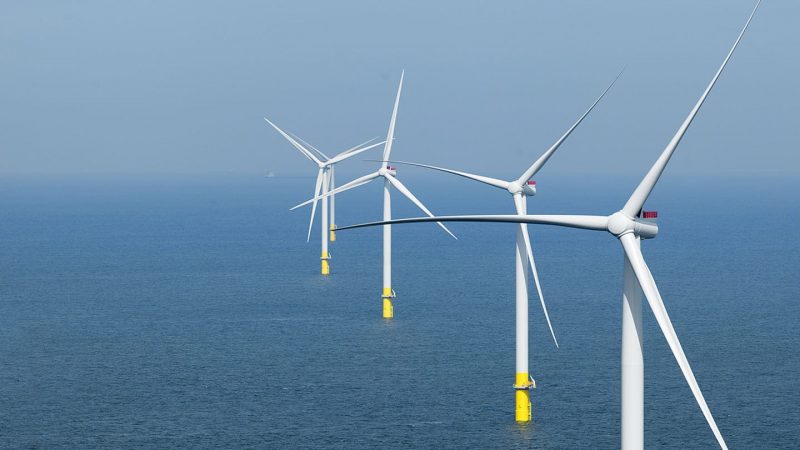
By DONALD WITTKOWSKI
Sea Isle City officials are adding to the suspicion that development work on offshore wind farm projects may be to blame for a flurry of whale deaths in the coastal waters of New Jersey and other states.
They are joining with others who are calling for a moratorium on wind farm activity to allow marine experts to conduct an investigation into the cause of at least 21 whale deaths on the Atlantic coast since early December.
“We need to have a pause now so that we can find out what’s happening with the whales,” Mayor Leonard Desiderio said during a discussion Tuesday at Sea Isle’s City Council meeting of whether there is any connection to the wind farms.
One of the deaths was a humpback whale that washed up in the neighboring town of Strathmere on Dec. 10 in an area known as Whale Beach. Other dead whales have been found on the beaches of Atlantic City, Brigantine and Manasquan in New Jersey as well as the coast of New York, Maryland and Virginia since Dec. 3.
Speaking during the City Council meeting, Sea Isle restaurant owner Mike Monichetti expressed concern that the whale crisis might be part of an even larger die-off of marine creatures that could have a devastating impact on the environment, the commercial fishing industry and tourism at the Jersey Shore.
“How long is this going to go on – until every whale is dead?” Monichetti asked.
Monichetti, owner of Mike’s Seafood & Dock Restaurant in Sea Isle’s historic Fish Alley neighborhood, said commercial fishing operators he has spoken to believe that the whale deaths are more extensive than just the ones washing up on the beaches so far.
“They’re floating out there in the ocean. There’s more than what we see washing up on the beach,” he said.
Monichetti wondered what the impact would be on Sea Isle’s tourism industry if suddenly a dead whale washed up on the beach on the Fourth of July, at the height of the summer vacation season.
He urged the mayor and Council members to get more closely involved in pressing the state and federal governments for answers about the whale deaths.
“I think Sea Isle City really needs to take an active role,” he said.
In response, Desiderio and City Solicitor Paul Baldini assured Monichetti that Sea Isle is among nine Cape May County communities that have partnered with the county government to call for a halt in wind farm activity until an investigation is done of the dead whales.
“We’re aware of it and very much involved in the process,” Baldini said.

In addition to serving as Sea Isle’s mayor, Desiderio is also the director of the Cape May County Board of Commissioners, the elected body that oversees the county government.
Desiderio announced earlier this month that he will work with U.S. Rep. Jeff Van Drew to find out whether there is a connection between the wind farm projects and the whale deaths. Van Drew’s congressional district includes the shore towns of Atlantic and Cape May counties.
“Just put a pause on this until we know the answers,” Desiderio said.
In the meantime, the National Oceanic and Atmospheric Administration has said there is no evidence linking the whale deaths with sonar mapping of the seabed that is being done as a part of the offshore wind projects.
Another group, the Marine Mammal Stranding Center in Brigantine, believes that collisions with shipping traffic have caused at least some of the whale deaths. Officials with the stranding center have pointed to wounds on the dead whales consistent with vessel strikes.
One of the proposed wind farms would be built 15 miles offshore between Atlantic City and Stone Harbor. The project would include nearly 100 towering wind turbines generating enough electricity to power 500,000 homes.
The project’s developer, the Danish energy company Orsted, maintains it has not been doing any work that would cause the whale deaths.
However, Sea Isle officials are among a growing number of local, county and state government representatives that remain unconvinced the wind farms aren’t to blame.
Desiderio said he is worried that Orsted’s wind farm will threaten Cape May County’s nearly $7 billion annual tourism industry.
Baldini, Sea Isle’s solicitor, predicted that the wind farms will harm not only the tourism industry, but also the Jersey Shore’s commercial fishing operations and wildlife, including birds that would be killed by the whirling turbine blades.
“The bird deaths are documented, so that’s going to happen,” Baldini said at Tuesday’s City Council meeting.
Baldini argued that extensive environmental studies should be completed before any of the wind farms are allowed to begin operations.
“The environmental studies have not been finished,” he said.

Orsted’s offshore project between Atlantic City and Stone Harbor is scheduled to begin generating electricity in 2024. Baldini said he doubts that Orsted’s environmental studies will be completed before the plant begins operations then.
Desiderio, meanwhile, hopes that the whale deaths will spark more public interest in the wind farm projects and their possible impacts on the environment and tourism.
“That’s the only way we’re going to get things done, by having the public involved,” he said.







